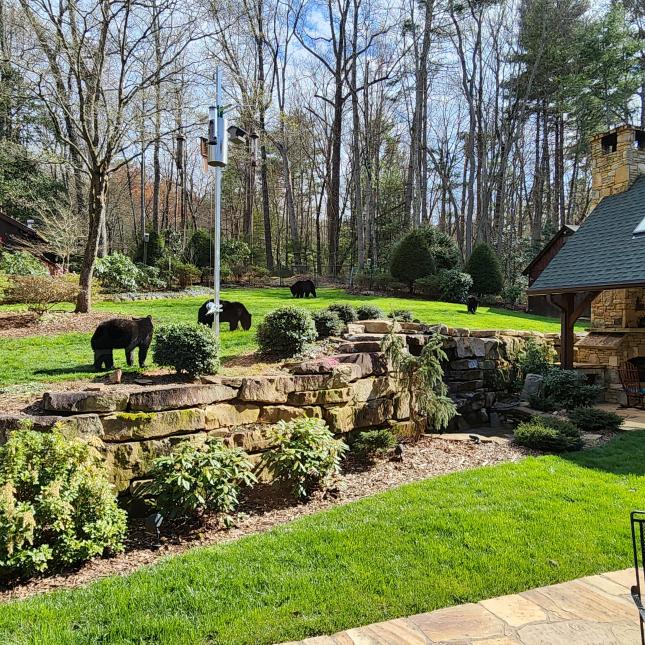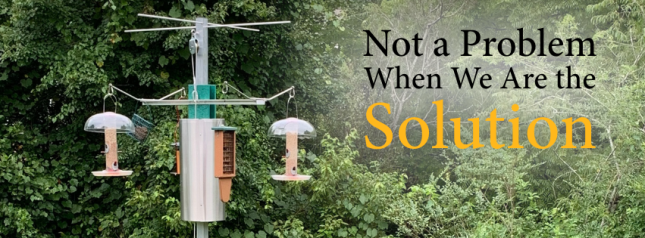Got Bears? We Have Solutions
Living in Bear Country!
Whether we like it or not, we are sharing our little part of nature with Black Bears. In order to prevent surprises and attacks we need to understand them, learn to live with them and respect that they have the right to live here too. However, there are several practices that can be implemented to help prevent bears being attracted to your backyard. It is entirely possible to feed the birds without feeding the bears.

Above, black bears browse Robert's yard in search of their next meal. His bird feeders used to be their go-to until he purchased the Aerial Bear-Resistant Bird Feeding Station. Now he sits back and watches as the bears wander through.
The Aerial Bear-Resistant Bird Feeding Station is the ultimate way to feed your backyard birds without bears interfering. Made from high-quality materials, including
aluminum and durable recycled plastic, the backyard bird show will take center stage in your yard. The Hilltop Aerial Feeding station is made in the USA and designed to last a lifetime. This system can lift your feeders 14 feet in the air, making your feeders inaccessible to undesirable animals. For extreme bear activity, tidy bird feeding should still be practiced. The main heavy duty 2″ square aluminum pole slides over a 1.5″ square metal ground stake. The ground stake will need to be set in a 9″ wide X 36″ deep cement base that even mischievous bears cannot knock over or climb. The optional pole baffle can stop any other critters from finding their way to your feeders. This station features four carabiners that keep feeders safely secured in most any weather and has additional roosting perches too! Within 30 miles of the store, this station is drop-shipped right to your home and guarantees you peace of mind. No more broken feeders or poles!
 Call the store today to ask us about pricing and installation.
Call the store today to ask us about pricing and installation.
There are a few other recommendations that can help deter bears from your yard, and these are all strategies that any of our Certified Bird Feeding Specialists can help you accomplish:
- Store bird food securely indoors at all times.
- Some bears do not like hot pepper bird food products, but they will investigate and test them as part of their
"learning curve" to avoid them. As with other critters, some bears may tolerate hot pepper products better than others. They may be willing to endure its effects when natural food supplies are low. - All bird feeders should be brought in each night and put out again in the morning. (Bears tend to be more
active at night.) While not foolproof, this is usually an effective method to keep bears away from the feeders
and food. - It’s important to fill bird feeders with quality seed appropriate to local birds. Cheap wild bird mixes contain filler
seed that many birds kick onto the ground. The fallen seed can then be utilized by unwanted rodents and
bears. - Suet and peanuts should not be offered as these two bird foods have a stronger scent than seed and are
more attractive to bears. - Use a patio base to make it easy to move the feeding station location on a regular basis to prevent seed
buildup on the ground. Also, the patio base pole system is also much less likely to get bent or broken should a
bear find it. - Tidy bird feeding strategies should be employed. Trays should be put on all feeders to minimize the amount of
bird food that spills to the ground. Try using a tube type feeder with a large tray. Use a 12” round plastic tray
and attach it into the feeder bottom. The tray will keep your bird seed from being tossed onto the ground. - Try only sunflower chips as they are a very tidy food source for birds.
- Some success has been reported using safflower seed as bears do not seem to like the taste. Caution should
be taken with this seed to ensure hull debris do not accumulate on the ground under the feeder.
Some other strategies that can be implemented in your yard and community include:
- Garbage: Never store garbage outside, unless it is in a bear-proof container. Don’t leave garbage or food in a
vehicle, even for a short time. - Barbeques: Burn your barbeques clean, wash and store them covered out of the wind – preferably indoors.
- Pet food: Feed your pets inside and store their food inside.
- Compost: Keep your compost clean – never compost animal waste. Sprinkle compost with lime. Lime aids in
the composting process and reduces the smell. - Fruit Trees: Remove fruit from trees as it ripens. Do not let fruit rot on the ground below the tree
Bear Safety at Home - Respect bears! If you see a bear in a residential area:
- Remain Calm: Often the bear is just passing through, and if it finds no food source, will simply move on.
- Keep Well Away: Do not crowd the bear – give it plenty of space. Warn others to be respectful; bring small
children and pets in the house. - Let the bear know it is not welcome in your backyard: Do not allow the bear to feel comfortable. Make lots of
noise and make your presence known to let the bear know it is in human territory. Ensure the bear has a safe
avenue of escape/exit. - When to call for help: If the bear appears to be threatening human safety, pets or destroying property call the police or Conservation Officer.
Here at Wild Birds Unlimited, we are committed to safe bird feeding as well as being bear aware in all aspects of our living and bird and wildlife watching activities.


